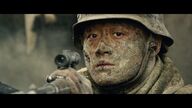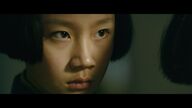My brother said to go to the movies together, only then did I know that Jinling's Thirteen Hairpins was released. It was postponed until Sunday to go to the cinema, and the ticket price was more expensive than other films. The expectations are not high. When I wrote the film review of "Love of the Hawthorn Tree" last year, I basically came to a conclusion. Few of the great directors of the fifth generation will go "to observe and perform uniquely with a strong desire for exploration and subjectivity." complex history and reality."
But after the movie ended, I really thought it was a movie worth watching.
[1937]
That year. For the Chinese, it is a nightmare.
The book says, "Hundreds of thousands of defeated troops were evacuating across the river, steel cannons were sunk into the river, and the fleeing crowds crashed to the ground, blocking several city gates." , The camphor wood box jumped into the river in the middle of winter, and gambled with life between the Japanese army coming from the city and the surging Yangtze River." The
film's calm display does not interpret it. Elevating, but not out of touch with reality. There is no scene of jumping into the river, but it adds to the tragic and solemnity of the frontal national army fighting the tank. It is not only death. The director also deliberately slowed down and artistically slowed down the final fall of each team member, and greeted them with the steps of a dancer. Towards death, it is like rushing to the light, and it is like returning.
Looking closely at the picture of the war, the sadness and grief in my heart welled up. What is a man's arm as a chariot, what is a body of flesh and blood, what is powerlessness, what is a strong man, gone and will never return. Nanjing City, the ancient capital of the Six Dynasties, will inevitably suffer catastrophe.
It's the end of the world.
Corpses are everywhere.
Where is Zhongling Yuxiu Jinling Township, it is clearly hell.
1937.
"There really is a God, how can God be so incompetent? He must have found many excuses for his God, one of which is: God showed a picture of hell to people, and there must be a great revelation. And he can't answer it at all. This is a revelation."
[December]
It's snowing heavily, the film is so cold, but the book says that the weather is a good day, and the end of Nanjing City is actually a good day.
The priest in the book is dead at the beginning of the film, and a bearded mortuary arrives for burial.
From here on, the story in the movie and the story in the book are not the same story, but are indeed another story.
That light, that shadow, that plain color, that cheongsam. Church stained glass. peeping. Blood.
Huang Biyun said, "Redemption with blood, purification with wine, purification with water, and shedding of blood for everyone, everyone finds redemption for everyone."
In the process of watching the film, I kept flashing back to some outstanding video clips.
Their light, shadow, perspective. it's the same. In it, there is no surprise.
Really, this is a film made with heart.
Thirteen or fourteen-year-old middle school students have the calmness and immersion in the play, the attitude and style of a dusty woman, and the ordinary and greatness of the mortuary. Layer upon layer, layer upon layer, as if the climax was always approaching and yet to come. The new soft and pathetic scars are touched in the midst of heavy encounters, it seems that it is not just a movie, not just history, but a living reality in front of us.
There was only one tear in the whole movie, but the emotions brought out by the movie lingered for many days after the end.
[13th to 25th]
are the most tragic days.
massacre.
There is humanity in it, bad, good, shameless. There is desire, to live, to die, to possess, to be mad. Mass madness and mass catastrophe.
There is also a light that struggles to break through the darkness.
"In mid-December 1937, the Japanese troops occupying Nanking heard the bible psalm rising from the sound of fire and blood. The singing was clear and transparent, and each note dropped into the hellish city like tears from heaven, The lost humanity of the arsonist, butcher-wielding, and adulterous invaders suddenly gathered at this moment."
All the gods closed their drowsy eyes. The demon also seemed to be silent for a while.
There is a feeling of being baptized. The soundtrack is really good.
But the clear singing is only a faint light, and war is always tyrannical, cruel, and the strong prey on the weak.
Female vocals and slow motion, that's part of the Qinhuai River. What I admire is the composure of the narrator. "The businesswoman does not know the hatred of subjugation of the country, but she still sings the flowers of the backyard across the river." Qin Huaijing indeed testified for those women.
The songs of the Bible cannot save all beings. But it was Yaojie, who was singing and dancing, who saved the students by changing her life.
"I have a love, sing it for all the gentlemen,
all gentlemen, please be quiet, calm your heart ,
let me sing a Qinhuai scene , and sing it
carefully for all the gentlemen
, Qinhuai flows slowly, Pangu has reached the south of the
Yangtze River The splendid Jinling is elegant and elegant
, the halls in Zhanyuan are wide and deep, and
the waters of Bailuzhou
are like a paradise. "
May the world be at peace.
The 74th Anniversary of the Nanjing Massacre
View more about The Flowers of War reviews











